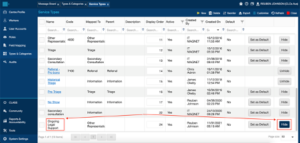Following consultation with state CLC peak bodies, CLC Funding Program Managers, the National Data Standards Working Group, and others, Ongoing Legal Support Service has now been added as a new service type to the National Legal Assistance Data Standards Manual.
It will be available in CLASS from January 2021.
In an Ongoing Legal Support Service, a Centre makes an up-front commitment to a Service User to provide them with ongoing support in their own efforts to resolve a legal matter. The Centre does not take carriage of the legal matter or represent the Service User in any legal proceedings.
This could be described as the Centre “shadowing” the Service User throughout the legal process, providing them with advice and support when requested, but never representing or acting for them.
The existence of a clear scope of services in which the Centre agrees to provide ongoing legal support through a particular legal matter, but not to represent or act for the Service User, is the way in which an Ongoing Legal Support Service can be differentiated from a series of discrete Legal Advices + Legal Tasks, or from any of the other ongoing Services.
The Centre needs to be clear with the Service User about the scope of the services. Although it is possible to verbally set out the intended scope of services, Centres are strongly encouraged to write a letter or email to the Service User setting out their decision to provide ongoing support, as well as the scope of the services – for example, if the support is through just one stage of a legal process, or through several stages.
Examples of scope of services:
CLCs Australia will also update the Risk Management Guide to include this information.
Where a Centre is providing a Representation Service to a Service User, they are acting for / representing that Service User. Correspondence to third parties are on Centre letterhead and/or will name the Centre as the Service User’s legal representative eg on court documents. If there are communications with third parties, these always make it clear that Centre is representing the Service User.
In an Ongoing Legal Support Service, correspondence and documents are in the name of the Service User, and third parties are told to communicate with the Service User rather than directly with the Centre.
However, there are some exceptions to this:
Where a Centre has not agreed to support a particular Service User throughout a particular process, but the Service User keeps coming back for more help, the work should continue to be recorded as a Legal Advice or Legal Task as appropriate. At a certain point, which each Centre may wish to set out in their legal practice management policy, the Centre will probably need to make a decision about how best to manage the Service User, keeping in mind the resource constraints and service eligibility policies of the Centre.
Each time the Service User contacts the Centre asking for further help in relation to the same legal matter, the Centre can choose to:
The trigger or criteria for a Centre to either refer the Service User away or commit to ongoing support will be different for each Centre, and therefore should be set out in the Centre’s legal practice management policy. For example, a particular Centre might have a casework policy that requires review of a Service User’s matter once they have had 3 Legal Advices and/or 2 Legal Tasks in relation to the same legal matter. Another Centre might set the review trigger at 2 Legal Advices.
Ongoing Legal Support Services provided between 1 January and 30 June 2021 will be mapped to Other Representation Services for the purposes of NLAP reporting. Ongoing Legal Support Services will be reported on separately after July 1 2021. You should talk to your Program Manager if you have any questions about how this will affect your accountability targets.
The fields and Action types within the new Service are the same as the fields and Action types for the Other Representation Service.
No. If you don’t provide ongoing support to self-represented Service Users then you won’t need to use the new service.
Not all Centres undertake this kind of ongoing legal support work. Some Centres have a service model of providing Legal Advice and the occasional Legal Task through advice clinics, and then taking on any Service User identified as being in need of more help as a Representation client.
If your Centre is not using this service type, you can hide it by navigating to System Settings and opening the Types and Categories page. There will be an option called Service Type. Here you can use the hide button to hide the ongoing legal support service option, along with any other service types your Centre does not deliver as shown in the screen shot below. If you have problems you may not have the correct permissions. You can ask a CLASS user with advanced administrator permissions within your Centre to hide these for you if needed or please contact the CLASS helpdesk on icthelp@clcs.org.au.

As part of the 2018-19 Data Consistency Project, CLCs Australia identified that one of the main sources of inconsistency in how CLCs were recording services was in relation to ongoing work undertaken for a Service User where the Centre had committed to (and was) supporting a Service User throughout a legal dispute or legal proceedings, but where the Centre was not acting for or representing the Service User.
Most Centres have been recording this work as separate Legal Advices and Legal Tasks, as required to by the National Data Standards. However other Centres were recording all this work under one Service – Representation-Other – even though this work clearly did not fit within the definition of Other Representation Service contained in the National Data Standards. They were doing this because they were frustrated with the inefficiency of:
Importantly, many Centres advocated strongly to CLCs Australia that in their view, these ongoing legal support matters were substantially different to simply providing a series of discrete Legal Tasks and Legal Advices. They argued that providing ongoing legal support to a self-represented person is a model of legal practice common to – and perhaps one of the defining features of – community legal centre practice. The people helped by Centres in this work are usually people who some have described as the “missing middle” – people who:
CLCs Australia agrees that this type of legal service provision which is substantially different to other service types, and tells an important story about the nature of work done by legal assistance services.


Community Legal Centres Australia acknowledges the traditional owners of the lands across Australia and particularly acknowledges the Gadigal people of the Eora Nation, traditional owners of the land on which the Community Legal Centres Australia office is situated. We pay deep respect to Elders past, present and emerging.

Community Legal Centres Australia is a proudly inclusive organisation and an ally of the LGBTIQ+ community and the movement toward equality.
ABN 67 757 001 303 ACN 163 101 737
Disclaimer | Privacy Policy
© Community Legal Centres Australia 2022 | Designed by DropIn Solutions